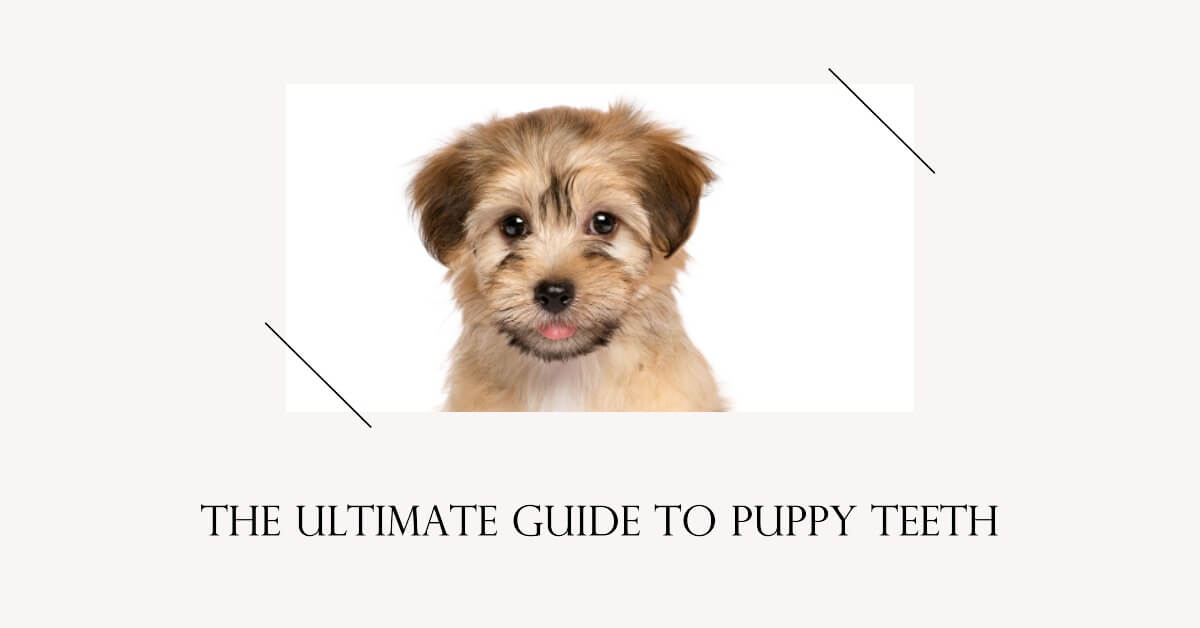Puppies are adorable, cuddly, and an absolute joy to have around. But with all the fun and love that they bring, comes a whole lot of responsibility. One of the most important aspects of taking care of your new furry friend is dental care, especially during their teething phase. In this ultimate guide, we will cover everything you need to know about puppy teeth, from care to teething relief.
Table of Contents
ToggleUnderstanding Puppy Teeth
Just like human babies, puppies are born without teeth. Their first set of teeth, also known as deciduous teeth or milk teeth, start to come in around three weeks of age. These are smaller and sharper than their adult teeth, with a total of 28 teeth that come in over the course of several weeks.
Around four months of age, your puppy’s deciduous teeth will start to fall out, making way for their permanent teeth. This is a crucial time for dental care, as it sets the stage for your pup’s oral health in the future.
Dental Care for Puppies
Taking care of your puppy’s teeth is an essential part of their overall health and well-being. Here are some tips for maintaining good dental hygiene in puppies:
Start Early
It’s never too early to start taking care of your puppy’s teeth. In fact, the earlier you begin, the better. As soon as you bring your new puppy home, start by introducing them to the toothbrush and toothpaste. Be sure to use toothpaste that is specifically designed for dogs, as human toothpaste can be harmful to pets.
Brush Regularly
Brushing your puppy’s teeth regularly is crucial for maintaining good dental hygiene. Ideally, you should brush your puppy’s teeth daily, but at a minimum, aim for 3-4 times a week. Use a soft-bristled toothbrush and be gentle when brushing. Focus on the outer surfaces of the teeth, as this is where plaque and tartar tend to build up.
Provide Dental Chews and Toys
In addition to regular brushing, providing your puppy with dental chews and toys can help keep their teeth healthy and clean. Look for products that are specifically designed to promote good dental hygiene, such as those that are designed to clean teeth or massage gums.
Schedule Regular Check-ups
Regular check-ups with your veterinarian are essential for maintaining your puppy’s dental health. During these visits, your vet will examine your puppy’s teeth and gums, looking for signs of any dental issues. They may also perform a professional cleaning if needed.
Teething Relief for Puppies
The teething phase can be a challenging time for both puppies and their owners. Here are some tips for providing relief during this time:
Frozen Treats
Cold temperatures can help numb your puppy’s gums and provide relief from teething pain. Try freezing some plain yogurt in ice cube trays or freezing a damp washcloth and letting your puppy chew on it.
Chew Toys
Chew toys are another excellent way to provide relief during the teething phase. Look for toys that are specifically designed for teething puppies, such as those made from rubber or nylon. Avoid toys that are too hard or small, as these can be dangerous for your puppy.
Gum Massages
Gently massaging your puppy’s gums can help alleviate teething pain. Use your fingers or a soft cloth and rub your puppy’s gums in a circular motion.
Distractions
Finally, providing distractions for your puppy can also help during the teething phase. Try giving your puppy puzzle toys or food-dispensing toys to keep them occupied and distracted from the discomfort of teething.
Common Dental Issues in Puppies
Despite your best efforts, dental issues can still arise in puppies. Here are some common dental issues to watch out for:
Loose Teeth
During the teething phase, it’s normal for your puppy’s teeth to become loose as their permanent teeth start to come in. However, if your puppy’s teeth are loose outside of this timeframe, it could be a sign of an underlying issue, such as gum disease or trauma. If you notice loose teeth, it’s important to schedule a check-up with your veterinarian to determine the cause.
Tooth Decay
Tooth decay in puppies is typically caused by a buildup of plaque and tartar on their teeth. If left untreated, it can lead to gum disease and other serious health issues. Regular dental care, including brushing your puppy’s teeth and providing dental chews and toys, can help prevent tooth decay.
Malocclusion
Malocclusion is a condition where your puppy’s teeth don’t line up properly, which can lead to dental issues and even difficulty eating. If you notice that your puppy seems to have difficulty eating or their teeth appear misaligned, it’s important to schedule a check-up with your veterinarian to determine the best course of action.
Gum Disease
Gum disease is a common dental issue in puppies and is caused by a buildup of plaque and tartar on the teeth. If left untreated, it can lead to tooth loss and even affect your puppy’s overall health. Signs of gum disease include red, swollen, or bleeding gums, bad breath, and difficulty eating. Regular dental care, including brushing your puppy’s teeth and providing dental chews and toys, can help prevent gum disease.
Broken Teeth
Puppies are prone to accidents, which can lead to broken or fractured teeth. If you notice that your puppy has a broken tooth, it’s important to schedule a check-up with your veterinarian to determine the best course of action. Depending on the severity of the fracture, your vet may recommend extracting the tooth or performing a root canal.
Conclusion
Taking care of your puppy’s teeth is essential for their overall health and well-being. By starting early, brushing regularly, providing dental chews and toys, and scheduling regular check-ups with your veterinarian, you can help prevent dental issues from arising. And during the teething phase, providing relief through frozen treats, chew toys, gum massages, and distractions can help ease your puppy’s discomfort. By following these tips, you can ensure that your puppy has healthy teeth and gums for a lifetime.
In summary, puppy teeth care is an essential aspect of pet ownership. Starting early, brushing regularly, providing dental chews and toys, scheduling regular check-ups with your veterinarian, and providing relief during the teething phase can all help keep your puppy’s teeth healthy and prevent dental issues from arising. By taking the time to care for your puppy’s teeth, you can help ensure that they have a lifetime of good dental health.































